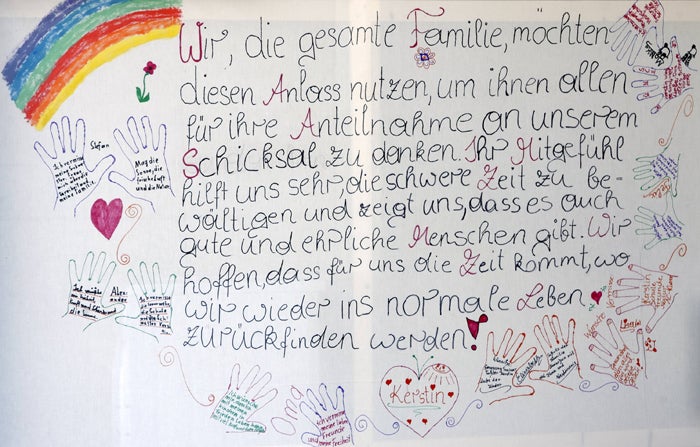Amstetten cellar victims thank town for support

The children rescued from the bunker below Josef Fritzl's house in Amstetten have created colourful posters to thank local people for their support since they were freed.
The discovery that Elisabeth Fritzl had been locked in the cellar at 18, repeatedly raped for 24 years by her father, and forced to have seven children by him shocked the small Austrian town to its core. Residents staged several public demonstrations of support, including a candlelight vigil. Now the family, who were encouraged to paint as part of their therapy, have responded with the brightly coloured posters illustrated with rainbows, hearts and flowers which have now been put on display in the main square.
"We, the whole family, would like to take the opportunity to thank all of you for sympathy at our fate," they said in a written message. "Your compassion is helping us greatly to overcome these difficult times, and it shows us there also are good and honest people here who really care for us. We hope that soon there will be a time where we can find our way back into a normal life."
The victims, who signed their works by drawing around the outlines of their hands, also shared some of their hopes for the future now they have found each other, and freedom. Elisabeth wrote that she wishes for a quick "recovery of my daughter Kerstin, the love of my children, protection of our family" and "people with a lot of heart and understanding".
Kerstin, who is seriously ill with a weakened immune system caused by her incarceration, was taken to hospital in the last week of April, which led police to the secret cellar and the exposure of 73-year-old Josef Fritzl's crimes.
Stefan, 18, writes that he misses his sister Kerstin, and is happy about his new-found freedom and family. "I like the sun, the fresh air and nature," he adds. Lisa, 16, who was not locked in the dungeon but allowed to live above ground as part of the "upstairs family", wishes for "love, happiness, health" and "that everything turns out well again".
Six-year-old Felix said he is dreaming of travelling by car again – his first trip was in a police car after being rescued from the cellar – and wants to "run across a meadow".
The family are being looked after at the Amstetten-Mauer clinic. "What is now clear is that the family will need to remain here for several more months," said the clinic head, Berthold Kepplinger. "To give them a good start in their new life they all need to be very carefully protected and very slowly reintroduced to the real world, and to each other.
"In particular, Elisabeth and her two children from the cellar need to have further therapy to help them adjust to the light after years in semi-darkness. They also needed treatment to help them cope with all the extra space that they now have in which to move about."
Join our commenting forum
Join thought-provoking conversations, follow other Independent readers and see their replies
Comments
Bookmark popover
Removed from bookmarks